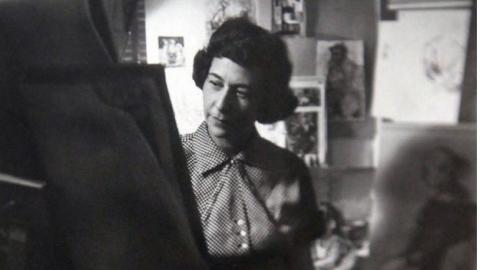New Film Celebrates the Life of Altina, the Woman Behind the Harlequin Glasses

Altina, a film by Peter Sanders, is a documentary valentine to his artist grandmother. It may not solve the riddle about the woman behind the cat’s eye frames she invented, but it’s a lively enough pastiche of the turbulent 20th century she inhabited. Through newsreels, archival home videos and close-up glimpses from some of the people whose lives she touched, we can enjoy the journey.
Born in 1907 in New York City, the youngest daughter of a tobacco tycoon and descendant of Sephardic Jews, Altina Shinasi hit the ground like a human grenade, her talent exploding in several directions at once. Enigmatic, elusive, eccentric and above all, bold, she would never admit to failure. At a time when a woman’s freedom took second place to a position of genteel respectability, she not only flaunted her passion for art and adventure, but followed the pulse of her sexual libido through four husbands.
Material advantages were a given but once consigned to the Dana Hall Boarding School in Wellesley, Massachusetts, she “knew it was not good to be Jewish.” In spite of her popularity among the other girls, she was denied a leadership role in her class. But Altina wouldn’t be denied for long. Marriage among the privileged loomed large as a means of independence, and by the summer of 1928, she was pregnant with her first child by architect and manic-depressive Morris Sanders. Though a second son brought her joy, the marriage ended after four years.
Taking the boys to Europe, she plunged into her life as an artist. (It’s important to remember, nannies and servants were close at hand when the creative urge called.) The samples of line drawings provided show an ease and freedom that came natural to her. The paintings themselves are reminiscent of all the artists that inevitably caught her eye. We see in her figurative semi-abstract studies hints of Picasso, Matisse, even Chagall. Back in New York at the Art Students League, she fell under the influence of George Grosz and Howard Warshaw. As one of her sons, surrounded by the social coterie of his mother’s artist pals in their sketching pursuits said, “Everyone had a nude in their house on Thursday nights.”
As for the Harlequin frames she designed, it was only a matter of time before Lugene on Madison Avenue agreed to show them for a six-month exclusive. Lord & Taylor soon followed and celebrities like Judy Holiday and Lucille Ball were quick to get in line for them. From that point forward their widespread success was assured.

But for Altina, the pursuit of her next paramour was as elemental as her creative drive and Erick Barrett, a charming and brilliant physician fit the bill. In Coldwater Canyon they set up housekeeping in the heart of the movie colony but unfortunately, love itself could not conquer her husband’s own battle with TB. It was during this period that the medium of film lured Altina as a way to express her sense of social injustice. She was quick to help friends escape from the horrors of the Holocaust and in 1954, was nominated for an Oscar for her documentary, A Time out for War on Nazi brutality. But Hitler wasn’t the only villain—Senator Joseph McCarthy’s witchhunt upended the careers of many of the most talented screenwriters in Hollywood, may of them acquaintances.
For Altina, art and social activism often went hand in hand. One of her most striking projects was the creation of murals for the front hall of Synanon, a drug-free haven and halfway house for many lost souls during the ‘60s.
Of all the cast of familiars that are given their say about Altina, perhaps the most moving is her fourth husband, Tino Miranda. This impassioned Cuban lovingly describes how their move to Santa Fe was prompted by a cancer diagnosis and his desire to live out his days among the animals and natural beauty of the Southwest. “We were a single soul,” he admits. It was there that he grew healthier and assisted Altina in creating wooden benches and Chairacters—chairs with fantasy figures carved into the design.
It was this last marriage that may have brought the greatest happiness to Altina. Thanks to Miranda’s intimate confessions, we can assume that was the case. The only shortcoming in the film is Altina herself. Her own interspersed narrative shows us a woman not given to emotional outbursts or the kind of heightened expressiveness that would seem to fit the size of persona we’re led to believe inspired so many. She comes off at times disinterested in finding herself the subject of such a story.
Still, we are left with a lively portrait of the times and an appealing blend of music by David Robbins that helps to move us along at a jaunty rhythm.
Distributed by First Run Features, Altina was awarded the Best Film and Best Director award in the 2013 Toronto Jewish Film Festival.
The film will be available on DVD on December 16.
Author Bio:
Sandra Bertrand is Highbrow Magazine’s chief art critic.
































































































































































































































































































































